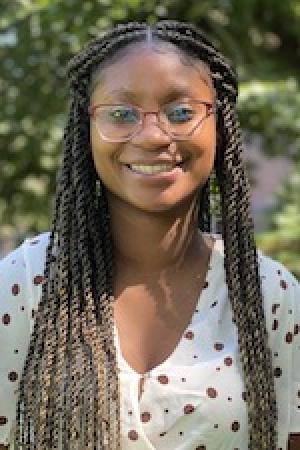People
Mirinda Morency
-
Pronouns: she, her, hers
-
Doctoral Student
Mirinda M Morency, a NIMH Predoctoral Fellow, is a PhD candidate in the joint Developmental Psychopathology and Clinical Science program at the University of Minnesota, Institute of Child Development.
Master of Art in Developmental Psychology, University of Minnesota, 2024
Master of Science in Social Work, Columbia University, 2019
Bachelor of Science in Psychology, Loyola University, 2015
Exposure to violence; Early adversity & adjustment; Discrimination; Trauma symptoms, risky behaviors, & physiological functioning; Adolescents and youth; Cultural, cross-culture; Prevention/intervention; Resilience; Mechanisms of change; Social determinants of health
Mirinda M Morency, a NIMH Predoctoral Fellow, is a PhD candidate in the joint Developmental Psychopathology and Clinical Science program at the University of Minnesota, Institute of Child Development. Her program of research focuses on identifying protective factors across the social ecology, including school quality, peer mentoring, and parental involvement, that empower Black youth to thrive despite navigating chronic environmental stressors, such as community violence, poverty, and discrimination, rooted in structural racism. While recognizing the importance of resilience, her work also critically examines the potential long-term mental and physical health costs associated with achieving resilience (i.e., skin-deep resilience). To meet these research objectives, she integrates mixed-methods research and multiple levels of analysis. She primarily works with Megan Gunnar and collaborates with Arthur Reynolds and Gail Ferguson.
Originally from the south suburbs of Chicago, Mirinda has a rich history of community-based participatory research in Chicago, exploring innovative violence prevention strategies. She directed a cross-age peer mentoring program aimed at mitigating adverse outcomes associated with violence exposure while fostering positive youth development. Building on this work, Mirinda partnered with Minnesota’s Hennepin County Safe Communities Department, conducting a qualitative research study to systematically understand the current landscape of violence prevention initiatives within the County. This study aimed to identify opportunities for enhanced understanding and collaboration among service areas to foster safe, healthy, and equitable communities, reimagining public safety.
Mirinda aims to further unpack the cultural nuances surrounding early childhood program effectiveness, investigating for whom and under what conditions these programs yield maximum impact and reduce or eliminate risk. She strives to translate her research into culturally-sensitive, developmentally appropriate preventive interventions for youth and families, ultimately contributing to equitable health and psychological well-being.
Developmental psychopathology and clinical science community/clinical work
Mirinda holds a Master’s in Social Work from Columbia University New York, where she provided trauma-informed clinical services to youth and adults for a few years before relocating to Minnesota. She is skilled in applying advanced modalities including Cognitive Behavioral Therapy (CBT) and Internal Family Systems (IFS) therapy to help clients build emotional resilience and navigate their recovery journey. Her clinical psychology training includes a neuropsychological assessment rotation at the University of Minnesota’s Pediatric Psychology Program, as well as an ongoing intervention rotation at the University of Minnesota’s Department of Psychiatry & Behavioral Sciences.
Peer Reviewed Publications:
Morency, M. & Reynolds, A. (Accepted). Do School and Family Factors in Adolescence Predict Midlife Psychological Well-Being? Findings from an Urban Childhood Cohort. Children and Youth Services Review.
Morency, M. M., Reynolds, A. J., Loveman-Brown, M., Kritzik, R., & Ou, S. R. (2024). Structural Equality
and Support Index in Early Childhood Education. JAMA Network Open, 7(8), e2432050-e2432050.
Gillespie, S., Morency, M. M., Chan, E., & Ferguson, G. M. (2024). Psychological and academic adaptation
through universal ethnic studies classes: Results of a natural experiment. Journal of Youth and
Adolescence. Advance online publication. https://doi.org/10.1007/s10964-024-02039-x
Reynolds A.J., Ou, S., Mondi C.F., Giovanelli A., & Morency, M. (In Press). Structural Inequality Modifies Midlife Outcomes of a Multisystemic Early Childhood Program for a Low-income, Urban Cohort. Families, Systems, & Health.
Morency, M.M., Donzella, B, Reid, B, Lee, R.M., Dengel, D.R., & Gunnar M. (2024). Post-adoption Experiences of Discrimination Moderated by Sleep Quality are Associated with Depressive Symptoms in Previously-Institutionalized Youth Even After Controlling for Physiological Differences Associated with Pre-adoption Deprivation. Development and Psychopathology.
Dinizulu, S.M., Velez, G., Morency, M., Jacobson, K., Moore, K., & Frazier, S.L. (2023). Lift Every Voice: Engaging Black Adolescents in Social Justice Service-Learning to Promote Mental Health and Educational Equity. Prevention Science. 1-17.
Sargent, E., Zahniser, E., Gaylord-Harden, N., Morency, M., & Jenkins, E. (2020). Examining the effects of family and community violence on African American adolescents: the roles of violence type and relationship proximity to violence. The Journal of Early Adolescence, 40(5), 633-661.
Quimby, D., Dusing, C. R., Deane, K., DiClemente, C. M., Morency, M. M., Miller, K. M., ... & Richards, M. (2018). Gun Exposure Among Black American Youth Residing in Low-Income Urban Environments. Journal of Black Psychology, 44(4), 322-346.
DiClemente, C. M., Rice, C. M., Quimby, D., Richards, M. H., Grimes, C. T., Morency, M. M., ... & Pica, J. A. (2016). Resilience in Urban African American Adolescents: The Protective Enhancing Effects of Neighborhood, Family, and School Cohesion Following Violence Exposure. The Journal of Early Adolescence, 38(9), 1286-1321.
Non Peer-Reviewed Publications:
Morency, M. (2022, April 14). Psychological Well-Being Starts Early. HCRC Evidence Matters. https://hcrc.dl.umn.edu/news/psychological-well-being-starts-early
Love, E., Morency, M., Miller, K., Onyeka, C., & Richards, M. (2018). How to involve young people in afterschool programs. Scholars Strategy Network. Retrieved from https://scholars.org/brief/how-involve-young-people-afterschool-programs

-
Institute of Child Development
Carmen D. and James R. Campbell Hall
51 East River Parkway
Minneapolis, MN 55455 - moren439@umn.edu